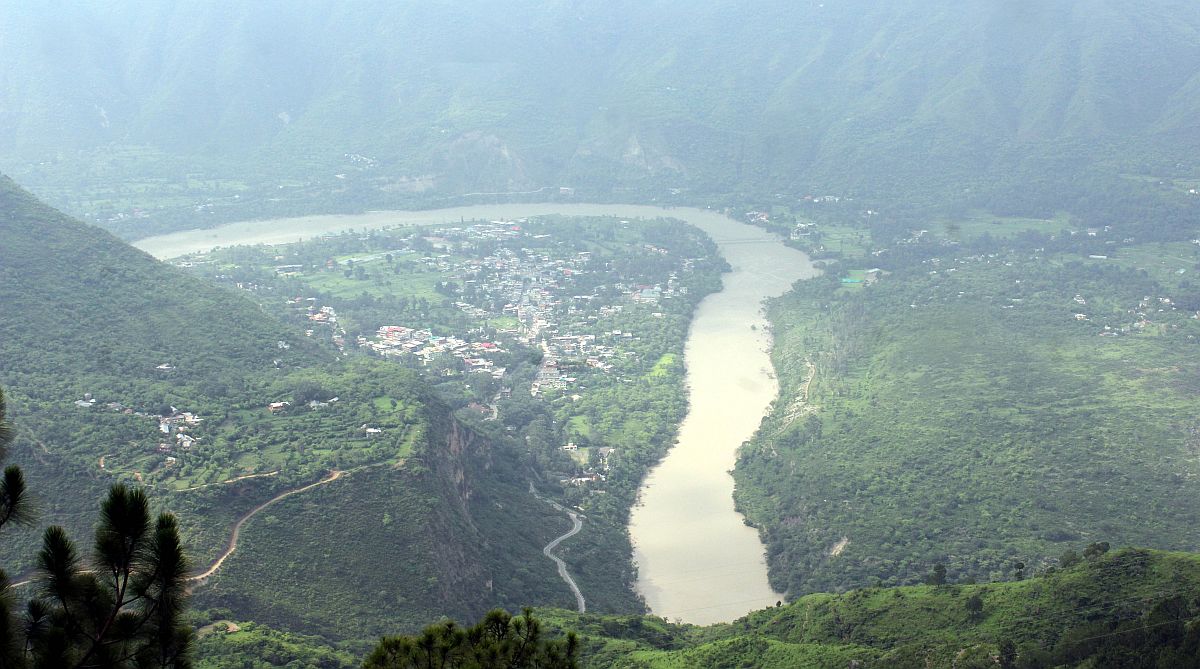K Kavitha questions Modi’s silence on Adani US bribery indictment
Political opponents are arrested without evidence and put on trial for months while Mr Gautam Adani walks free despite repeated and grave allegations, she said.
Following the Pulwama attack, India had immediately revoked the Most Favoured Nation (MFN) status accorded to Pakistan in 1996 and also hiked tariff on imports from Pakistan by 200 per cent.

An aerial view of Sutlej river. (Photo: IANS)
A day after India announced its decision to stop the flow of its share of water from the Beas, Ravi and Sutlej to Pakistan, Islamabad said that it was not concerned if New Delhi diverted water of the three eastern rivers.
Speaking to Dawn news on Thursday night, Secretary of Pakistan’s Ministry of Water Resources Khawaja Shumail said: “We have neither concern nor objection if India diverts water of eastern rivers and supplies it to its people or uses it for other purposes, as the IWT (Indus Waters Treaty) allows it to do so.”
“Under the leadership of (Prime Minister Narendra Modi), our government has decided to stop our share of water which used to flow to Pakistan. We will divert water from eastern rivers and supply it to our people in Jammu and Kashmir and Punjab,” Water Resources Minister Nitin Gadkari tweeted on Thursday.
Advertisement
This follows a series of diplomatic measures adopted by India to “choke” Pakistan after the deadly Pulwama terror attacks that killed at least 44 CRPF personnel on February 14.
“The construction of dam has started at Shahpur-Kandi on Ravi river. Moreover, Ujh project will store our share of water for use in J&K and the balance water will flow from 2nd Ravi-BEAS Link to provide water to other basin states,” Gadkari said in a second tweet, adding that all the projects are National projects.
Following the Pulwama attack, India had immediately revoked the Most Favoured Nation (MFN) status accorded to Pakistan in 1996 and also hiked tariff on imports from Pakistan by 200 per cent.
However, Shumail said Pakistan did not see India’s decision as worrisome in context with the IWT.
“But we will definitely express our concerns and raise objections strongly if they use or divert waters of western rivers (Chenab, Indus, Jhelum) on which our right to use prevails,” he added.
According to Pakistan’s Commissioner for Indus Waters Syed Mehr Ali Shah, as the IWT has already given a right to India in 1960 to use the water of eastern rivers, it is now up to it to do so or not.
“Whether they diverted and used their unutilised share of eastern rivers’ waters in 1960, we had no problem. They want to do it now, we have no problem. And if they don’t want to use this, we have no issue,” Shah told Dawn.
Gadkari had on Wednesday hinted at the decision to divert waters at an event in Baghpat.
“Following the partition, India and Pakistan got three rivers each but the water from our rivers was going to Pakistan. Now we are planning to build a project and divert the water from these three rivers into the Yamuna river. Once this happens, river Yamuna will have more water,” he said.
Gadkari was referring to the flow of water as per the Indus Water Treaty, which was signed on 19 September 1960 by then Indian Prime Minister Jawaharlal Nehru and Pakistani President Ayub Khan.
In November 2018, India had decided to fast-track the three projects on the ‘eastern’ rivers to arrest the unutilised water of its share under the bilateral treaty with Pakistan.
According to the treaty, Pakistan gets 80 per cent access to the water of the three of India’s ‘western’ rivers — the Indus, the Chenab and the Jhelum – and India got the three ‘eastern’ rivers – the Beas, the Ravi and the Sutlej – which have a flow of 33 million acre-feet (MAF).
India can use western rivers but for consumption purpose only. The treaty places restrictions on the building of storage systems and also states, with exceptions, that India cannot build irrigation systems on the western rivers.
Though the treaty was never abrogated in spite of the wars that India and Pakistan fought, it came under great scrutiny following the Uri terror attack. At the time, the clamour for the abrogation of the treaty was so intense in India that the United Nations pointed out that the treaty has withstood three wars.
Advertisement